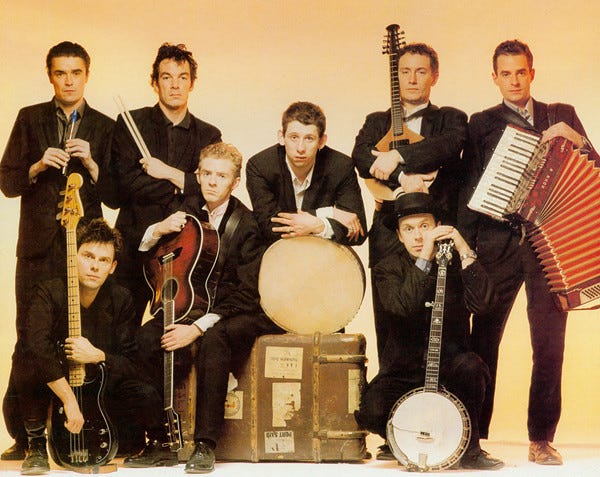I used to worry that I drank too much, that my gambling was out of hand, that my language was offensive, that I spent too much time daydreaming, that my outlook on life was fatalistic, that I was incapable of sustaining a long relationship, that I would never understand money and that eventually I would go to prison for a crime I did not commit. Then I listened to the Pogues and stopped worrying. Today I stand before you and proudly declare, “hey, world, I’m a Drunken Irish Bastard and if you don’t like it, well, here, I got something your wife might like.”
Drunken Irish Bastards used to be hot tuna, man, with guys like Eugene O’Neill, F. Scott Fitzgerald, James Joyce, Damon Runyon, John Huston, Stephen F. Foster and all the rest of them fightin’ and fuckin’ and fallin’ down all the way to the top. Then, I don’t know what happened, but all of a sudden it was no longer cool to stagger around, slurring epithets and peeing into the potted palms at the El Morocco room. Christ, look what happened to Declan MacManus (slave name: Elvis Costello) when he tried to revive Drunken Irish Bastardry in the late Seventies. Poor guy got his glasses knocked off by Bonnie Bramlett just for mouthing off. You should’ve heard what Fitzgerald used to say about Ray Charles.
Shane MacGowan is the new savior of Drunken Irish Bastards. Unstable, boozed-up visionaries of Irish descent are turning up on more and more “What’s Hot” lists, thanks to the songs and brave vocals of MacGowan and the play of his Pogues. I expect this, their fourth album, to do for the proliferation of the DIB what Farrah Fawcett did for the curling iron. Tom Waits, Irish, Drunken, and a bastard (just ask Rickie Lee Jones) could’ve led the new movement ten years ago but he had to go and sing like an old black man. The Pogues realize that the key to being Drunken Irish Bastards is to be absolutely white. Their music is virtually devoid of Negroid influence. This is white boy funk music, the stuff of our ancestors created when they were as oppressed as blacks are now. It’s got guts and soul, and will make poor people dance until 4 a.m., even if they have to be at work at 7 a.m. Drunken Irish Bastards with talent become writers, musicians, and artists so they can sleep until two in the afternoon and not have to get dressed until five minutes before they go out for the night.
You don’t have to drink or be a bastard to fully appreciate the Pogues, but you do pretty much have to be Irish. And if you’re Irish, why aren’t you drinking, you bastard? After all, you still haven’t found what you’re looking for and you won’t sleep until you meet up again with that pair of brown eyes that were looking at you. Irish people are always searching for something that they know they’ll never find. The dream dies every day and, as at an Irish wake, the mourners toast their dead and sit around the coffin getting drunk until the pain is acceptable. Drunken Irish Bastards go through that ritual every night as penance for the sin of not finding the answer to the big question. If you can swing it, like the Pogues, you put your Hail Marys and Our Fathers on albums and release your Act of Contrition as a 12-inch single.
Though originally I thought this album was as flawless as a body in a bikini in Sports Illustrated, repeated listens have tempered my enthusiasm and exposed a few clunkers. Songs I don’t play anymore are “Turkish Song of the Damned,” which sounds like a non-LP B-side by the Psychedelic Furs, and “Sit Down by the Fire,” which finds MacGowan’s crowded lyrics racing the tempo and losing by a head. About half of the time I skip “Fiesta,” which is what you might expect if Madness covered a Los Lobos song, and “Birmingham Six,” an obvious ode to oppressed Irish rebels over a melody Debbie Gibson would find simplistic. Still, this LP on cassette will cause more wear on the rewind button than on the fast forward. The title track is so good that I usually play it again after I hear it the first time each day. I also can’t get enough of “Lullaby of London,” the corny yet stirring “Thousands are Sailing,” the elegant “Broad Majestic Shannon,” and the Christmas single, “Fairytale of New York.” “Bottle of Smoke,” about putting it all on a long shot and watching it win, is so badass and pounding and bold that it’ll spit whiskey in your eye if you so much as think of calling it “Runyonesque.” If the Clash were nuts about Irish music instead of reggae, they’d have woken up every morning and tried to make “Bottle of Smoke.”
The Drunken Irish Bastard is back. He smiles through rotten teeth, dressed to swill in a baggy black suit. He’s standing there where the dreams end, trying to put his soul into words that match the tempo of his heart. He’s the man who knows too much about something he can’t name and it drives him crazy until the liquor finally rescues him and the ghosts take him home and put him to bed.

